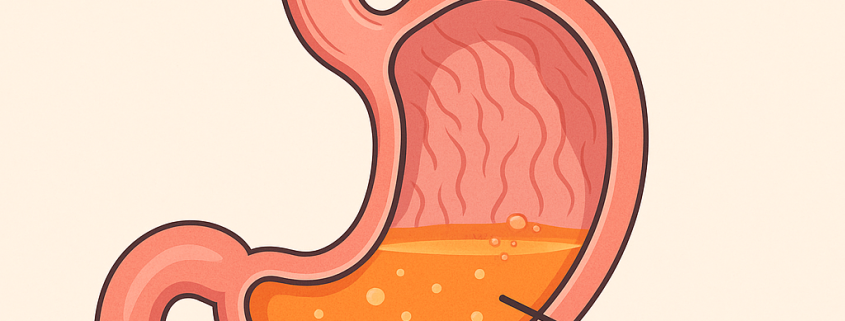The Importance of Stomach Acid: Insights from a Nutritionist
Stomach acid is widely misunderstood — and as a nutritionist in London, I often explain that it’s not just a source of discomfort but a vital part of healthy digestion. Adequate stomach acid is essential for breaking down food, absorbing nutrients, and protecting the body from microbes that enter with meals. When levels are too low, digestion slows, vitamins and minerals are poorly absorbed, and symptoms can appear that look surprisingly similar to having “too much acid.” In this article, I’ll explore how stomach acid works, what can go wrong, and practical ways to support a healthy digestive environment.
What Is Stomach Acid?
Stomach acid is primarily hydrochloric acid (HCl) secreted by parietal cells in the gastric lining. In a healthy fasted stomach, gastric fluid is highly acidic (typically pH 1–3). This acidity is not an accident of biology—it is a carefully regulated feature that enables several critical tasks.
Core functions
- Protein denaturation: Acid unfolds complex proteins so enzymes can access peptide bonds.
- Enzyme activation: Pepsinogen converts to pepsin only in an acidic environment.
- Micronutrient liberation: Acid frees vitamin B12 from food proteins and improves the solubility of iron, calcium, and magnesium.
- Antimicrobial defense: Low pH helps neutralize many pathogens before they reach the intestine.
- Downstream signaling: Acidic chyme entering the small intestine triggers bile release and pancreatic enzymes.
Why Low Stomach Acid Matters
Insufficient acid—often called hypochlorhydria—affects more than comfort after meals. Because digestion begins in the stomach, inadequate acidity can echo through the entire gastrointestinal tract. Consequently, people may experience symptoms that are diverse and sometimes confusing.
Common signs that warrant attention
- Bloating, belching, or a heavy feeling after eating
- Early fullness, especially after protein-rich meals
- Undigested food fragments in stool
- Reflux-like symptoms that temporarily improve with acid-suppressing medicines yet return or worsen over time
- Unexplained fatigue or brittle nails (possible micronutrient shortfalls)
These symptoms are not diagnostic on their own. Nevertheless, they highlight the importance of a proper assessment with a qualified healthcare professional. Because several conditions can mimic one another, self-diagnosis is not recommended.
How Stomach Acid Supports Nutrient Status
Healthy gastric acidity acts like a “key” that unlocks nutrients from food and prepares them for absorption further along the gut.
Vitamin B12
Vitamin B12 binds tightly to proteins in animal foods. Acid helps release B12 so it can attach to intrinsic factor, a carrier that escorts it to the ileum for absorption. With chronically reduced acid, B12 release from food can be compromised, increasing the risk of low levels over time.
Iron
Non-heme iron (the form found in plants and fortified foods) is better absorbed when it is kept in a reduced, soluble state—something acid helps accomplish. When pH rises, iron becomes less soluble, and absorption may fall.
Calcium and Magnesium
While multiple factors influence mineral absorption, solubility improves in an acidic environment. Therefore, individuals with persistently low acid may struggle to maintain robust mineral status, especially if dietary intake is marginal.
What Reduces Stomach Acid?
Gastric acidity fluctuates naturally throughout the day. Still, several influences can lower acid production or raise gastric pH for extended periods.
- Aging: Acid output tends to decline gradually with age.
- Helicobacter pylori: This bacterium can alter the gastric environment and, in some people, is associated with reduced acid production.
- Long-term acid suppression: Frequent or prolonged use of proton pump inhibitors (PPIs) and some other medicines reduces acid and can influence micronutrient status if not monitored.
- High-stress states: Sympathetic dominance may blunt digestive secretions when it becomes chronic.
- Very low stomach stimulation at meals: Eating rapidly, skipping meals, or relying heavily on ultra-processed foods may not provide the mechanical and sensory cues that support robust digestive secretions.
Is “Too Much Stomach Acid” the Problem?
Heartburn and regurgitation are often assumed to come from excess acid, yet the picture can be more nuanced. Reflux symptoms relate not only to acidity but also to pressure dynamics at the lower oesophageal sphincter, gastric emptying, meal composition, and body position. In some cases, inadequate acid contributes to poor protein digestion and delayed emptying, which may aggravate upper-GI symptoms. Because presentations vary, individualized assessment is essential.
Evidence-Informed Ways to Support Healthy Gastric Acidity
Small, consistent changes tend to outperform drastic overhauls. The following strategies are grounded in physiology and clinical best practice. Importantly, these suggestions are not substitutes for medical care, especially if you have a history of ulcers, reflux disease, or take prescription medicines.
1) Build meals that naturally stimulate digestion
- Include a source of protein at most meals to encourage pepsin and acid release.
- Add a modest portion of naturally bitter foods—rocket, watercress, radicchio, dandelion greens, or citrus peel zest in dressings.
- Use fermented foods (e.g., sauerkraut, kefir, plain yogurt) if tolerated. Start with small amounts.
2) Adopt meal habits that support secretion and motility
- Pause before eating. A few slow breaths can shift the body toward “rest-and-digest.”
- Chew thoroughly. Mechanical breakdown reduces the stomach’s workload and improves mixing with acid.
- Avoid very large fluid intakes with meals. Sip if needed; hydrate between meals instead.
- Finish dinner 2–3 hours before lying down. This timing supports gastric emptying and comfort.
Frequently Asked Questions
Can low acid cause reflux?
Reflux has many contributors. While low acid itself does not “burn” the oesophagus, it may slow gastric emptying and lead to post-meal pressure that encourages reflux in some individuals. Therefore, addressing motility, meal timing, and body weight where relevant often helps.
Should everyone avoid acid-suppressing medicines?
No. PPIs and similar medicines can be appropriate and even essential for certain diagnoses (for example, healing erosive esophagitis or preventing bleeding in high-risk settings). The goal is not to avoid them categorically but to ensure the right indication, dose, and duration under medical supervision.
Is apple cider vinegar a cure?
Vinegar is not a cure. Small amounts diluted in water before a meal may feel helpful for some adults, largely because sour taste can stimulate digestive secretions. However, it is not suitable for everyone and should be avoided if it provokes pain or reflux.
When to Seek Medical Advice
Contact a healthcare professional promptly if you experience any of the following:
- Unintentional weight loss, persistent vomiting, or trouble swallowing
- Black, tarry stools or vomit that looks like coffee grounds
- Severe or worsening heartburn despite treatment
- Ongoing fatigue with signs of anemia
Key Takeaways
- Stomach acid is essential for protein digestion, micronutrient availability, microbial defense, and downstream digestive signaling.
- Low acid can masquerade as other digestive problems; evaluation is important.
- Food-first strategies, supportive habits, and clinician-guided care can help maintain a healthy gastric environment.
Disclaimer
The information in this article is for educational purposes only and is not a substitute for personalized medical advice. Do not start, stop, or change any medication or supplement without consulting your healthcare provider. Individuals with a history of ulcers, gastritis, or reflux disease should seek medical guidance before trying bitters, HCl, or other targeted supports.
Working with a Nutritionist
Book an appointment today if you feel like you need more assistance or direction to reach your goals.
Online consultation with a Nutritionist is available for clients who live outside the London area or who are unable to come to my London office. You can enjoy the online consultation from the comfort of your home or office and you will be given the same level of personal attention and care that you would experience coming to see the Nutritionist in person.
Please note, the links provided are Amazon affiliate links. If you buy something using these links, I will receive a small commission, at no additional cost to you. Rest assured that all products recommended have been personally used and endorsed by myself.








Leave a Reply
Want to join the discussion?Feel free to contribute!